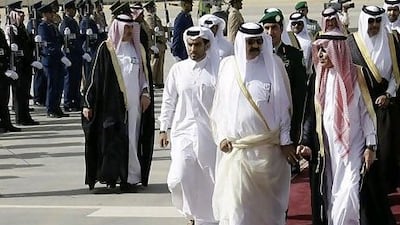Federal political unions do not have a good historical track record. The most successful and enduring in the world today is the United States of America.
But unity was enforced only in the 19th century after a bloody civil war to stop some members of the union from seceding.
Most others fall apart, often in bloodshed and chaos, especially when the unifying imperative comes from a single powerful, culturally cohesive entity at the core of the proposed union.
The Soviet Union existed for 70-odd years largely because of the threat of military action against any dissenting peoples who resented Russian domination. Today's Russian Federation displays many of the same potential tensions.
Perhaps a few years ago, the European Union could have been held up as a case study in voluntary unity. The EU was making the transition, slowly and cautiously, towards fuller political union after decades of greater economic cooperation.
Now, of course, that facade of inevitable progress towards a United States of Europe has been halted by the fall-out from the global financial crisis.
At the heart of the current crisis in the euro zone is the same old complaint levelled by separatists against any big unifying power. In this case the dominant unifier is Germany, which many in the EU believe is using the financial crisis to strengthen its grip on the economies and political systems of its supposed European partners, such as Greece.
In the Middle East, there are - so far - only two examples of federally unified political structures: the short-lived United Arab Republic between Syria and Egypt lasted three years before the Syrians began to resent Egypt's dominant role. It seems bizarre now to think that Iraq was viewed as a potential member of the UAR.
The other regional example is the UAE, which has existed for 40 years as a federal unit and, by overwhelming consensus, has been remarkably successful at balancing the ambitions of the dominant entity, Abu Dhabi, with the interests of the other members, Dubai and the five Northern emirates.
But even here, the financial crisis of 2008 and 2009 has caused strains on the union that are still being worked through.
This historical background should be borne in mind by the policymakers of the GCC as they explore routes to greater unity among the six members.
The impetus for unity this time is coming from Saudi Arabia, where the most recent summit of GCC nations in Riyadh agreed to study plans for a closer union.
The GCC is under pressure from West and East to speak with a single voice. The oil producers are keen to defuse any possible extension of the (mainly North African) Arab Spring upheaval on the Arabian peninsula, and ever-present tensions with Iran and the Shia majorities in Iraq and Bahrain are other spurs to unity.
The Riyadh summit held back from proposing a timetable, and did not push plans for EU-style unification, although some Saudi ministers believe this is the way forward. It is surely appropriate to take as much time as is necessary over such a far-reaching plan.
Other moves towards unification - such as the proposed common currency in the GCC - raised fears in other states that Saudi Arabia would dominate the proposed new entity. As the largest economy and most populous of the GCC members (bigger than all the others combined), these are natural fears that will have to be negotiated with some finesse.
In any case, there are projects that could be approached on a GCC-wide level more immediately. Infrastructure such as road and rail connections, essential economic investment such as increasing the region's oil refining capacity, and security issues, can all be broached more readily.
The countries of the GCC are young political entities that won their independence after centuries of foreign domination.
They will not want to diminish that new-found sovereignty lightly or without being persuaded of clear benefits such a move might bring.

